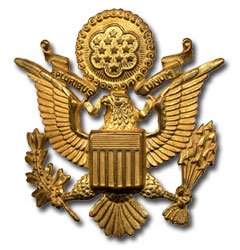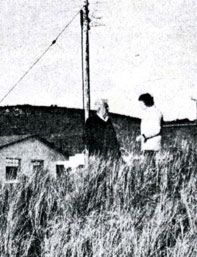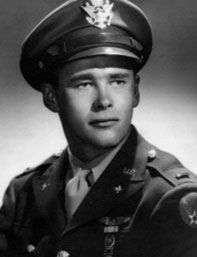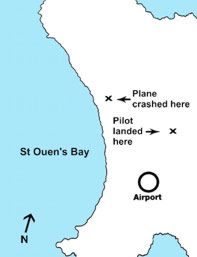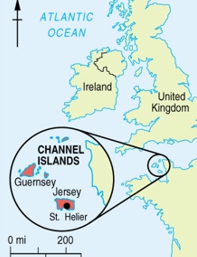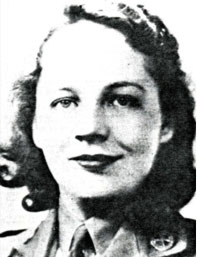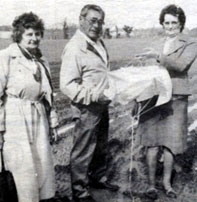Bail-out over Jersey Island
An American Army Air Corps class ring that was returned to its rightful owner in Toronto, Canada, after 20 years had a story that began in Jersey in February, 1944.
Returning from escorting a bombing raid on Frankfurt. Germany, on 7 February 1944, Second Lieutenant Joseph M. Krebs was nursing his badly shot up Mustang P-51B fighter aircraft of the 354th Pioneer Mustang Group, 355th Fighter Squadron, 9th U.S. Army Air Force, back to base at Boxtead, near Colchester in Essex. Well off course and with only 30 gallons of fuel left in his tanks, his chances of actually making it to base were very slim as he found himself over Jersey which, like the other Channel Islands, was bristling with German flak batteries.
Although the 354th Mustang Group had the most aerial combat victories, as well as having destroyed many enemy aircraft on the ground, Lt. Krebs realised that now the tables were turned and on this occasion he was to be the loser.
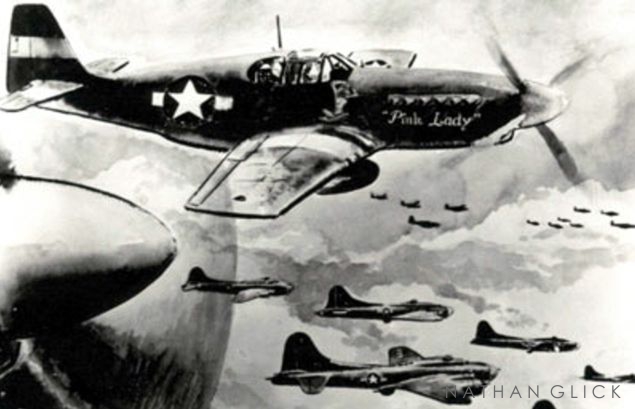
Lt. Krebs' P-51B Mustang "Pink Lady", escorting B-17 Flying Fortress into France as depicted by unit artist Nathan Glick.
Soon the Mustang was reeling from the fire of the German batteries at St. Ouen in the west of the island and with the engine spluttering, the aircraft began to lose altitude and Lt. Krebs decided it was time to bail out. The Mustang turned onto its side and crashed close to Le Chemin du Moulin, St. Ouen, where it soon burnt out.
The German gunners continued to fire at the airman as he dangled in his parachute but with a Force 7 wind blowing he was carried across the countrywide faster than a person could run and eventually came to earth in a field near "Greenlands", St. Peter, when his parachute caught momentarily in a tree. It was here that he received severe injuries to his neck and a fracture of his right shoulder. Several people went to his assistance and released him from his ‘chute which promptly blew away in the storm.
There were swift exchanges of questions and answers between Lt. Krebs and the islanders... "Was the island in enemy or Allied control?"… "Would escape be possible?"... "How was the war going?" and so on.
The downing of the Mustang had been witnessed by Mr. Joseph Ellis Carre who was felling trees at St. Ouen's Manor at the time. He decided to try to reach the pilot before the Germans did and so, mounting his bicycle, he was soon on the scene and remembers that he was given Lt. Krebs' address just before the soldiers arrived. He kept this address for some years but eventually mislaid it while moving house.
Although it was subsequently rumored that those who had gone to the assistance of the American pilot were arrested. Mr. Carre recalls that this was not the case and he was merely asked what he was doing there and had his identity card checked.
The squad of young soldiers who had been sent to capture Lt. Krebs eventually arrived and took him off on foot to a nearby farmhouse which was being used as a command post and the billet of a high ranking officer. This officer tried to be very pleasant and with the help of a German soldier who spoke perfect English, began to interrogate the American. However, the latter replied in American slang which confused the interpreter who was dismissed and the officer became rather upset!
After a short wait livened with a bottle of beer, Lt. Krebs was taken to the Airport in an enclosed truck where he was met by a Luftwaffe Major who was less friendly than the first German.
He ordered the N.C.O's present to strip the American whose arm, by this time, was so swollen that his shirt had to be cut off. The Major searched every stitch and seam of his clothing with Lt. Krebs gradually becoming more cold, angry and humiliated while his captors obviously were amused at his discomfort.
Examining the airman's life jacket, the Major found a packet of sea marker dye and showed great interest in his discovery which prompted Lt. Krebs to simulate a fake concern that something very special had been found; whereupon the Major tore the packet of dye from the life jacket and spilled some of it on his uniform, thereby causing some amusement to the American but not to the Major. Immediately the atmosphere became tense and the soldiers released the safety catches on their machine pistols. Lt. Krebs then said ''Water" but upon this being applied to the dye an even worse mess ensued!
The American eventually had his clothes returned and he was taken to the civilian prison in Gloucester Street, on the site now occupied by the Gwyneth Huelin Wing of the General Hospital.
The Prison
During his short stay in Gloucester Street, Lt. Krebs got to know the German Unteroffizier in charge of the guard. Known as Herrmann, the German was very good to the airman, making him comfortable in the office during the day and escorting him to and from his cell when necessary. Lt. Krebs noticed that the other adjacent cells were empty and he did not see or hear any other prisoners.
Belza
It was in Gloucester Street Prison that he first met Belza Turner, a 21 year old Canadian whose parents resided at "Richelieu", Bagot, St. Saviour and owned the Bagot Laundry. Having heard on the grapevine that an American flier had been shot down, she determined to try to get to see him and bribed the German guard at the prison with some butter that she had bought on the black market for RM20, butter being a valuable commodity at that time.
Even so, she was still surprised when the German agreed although he was a little apprehensive at first. So, too, was Lt. Krebs as he feared that Belza might be a "plant" sent to get information out of him and so he was very cautious at first. Eventually reassured, he gave the name and address of his aunt in America (Mrs. Dorothy McQueen, Madison, Wisconsin) to Belza in the hope that she could get a message to his relative but asked that his surname not be used as it was obviously of German origin, (a General Krebs was the last Chief of the German General Staff in 1945), and he did not want the military authorities to suspect anything.
Belza sent the message off the next morning through the Red Cross Message Office in St. Helier and this read: “Joe jnr. fine and dandy, will write when settled, Love Belza”.
As Lt. Krebs was the only relative of Mrs. McQueen serving in the U.S. Forces, the lady immediately recognised her nephew as being the subject of the message as he had been reported by the U.S. authorities as "Missing in Action." Belza's Red Cross message was delivered in June, 1944, and although she waited for repercussions, none came. The Germans themselves did not notify the U.S. authorities of Lt. Krebs' capture until near the end of the war.

